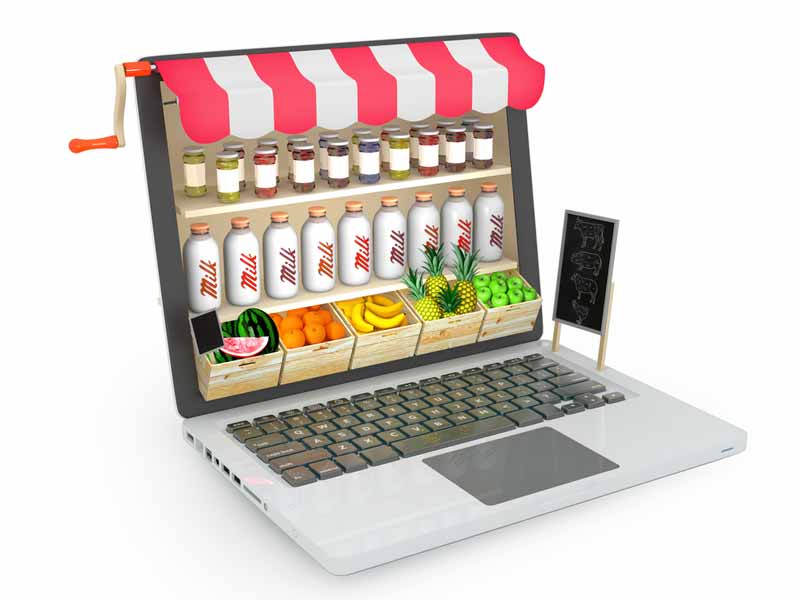
Best Practices for Starting a Grocery Delivery Service
Starting an online grocery business for a small-to-medium supermarket can seem intimidating and overwhelming, but it doesn’t have to be. The key for traditional brick-and-mortar grocers to compete in the online grocery landscape is to have a framework for understanding what you can do to leverage the strengths of your stores and your proximity to shoppers. At Bringoz, we’ve been working with a number of grocery chains, providing them with a SaaS-based delivery management platform to build and scale a flexible operation that uses their own employees or third-parties, designed to maximize the customers journey at lower operational costs.
A Bright Future for the Online Grocery Business
Online grocery may not be a big part of the overall industry right now, but don’t let that fool you. Only 10% of U.S. customers say that they regularly shop online for groceries, however the value of the U.S. online grocery market grew from $12 billion in 2016 to $26 billion in 2018 and continues to grow rapidly. In as few as five to seven years, 70% of consumers will be grocery shopping online, according to a study from the Food Marketing Institute and Nielsen.
Several major grocery retailers are capitalizing on the growing trend towards online grocery. Target recently integrated its same-day delivery service Shipt, which it acquired two years ago for $550 million, into its mobile app to reach more customers. Kroger piloted 30-minute online grocery delivery and has partnered with U.K online grocer Ocado to build 20 automated warehouses over the next few years in the U.S. These warehouses will enable Kroger to use digital and robotic technology to fulfill online grocery orders quickly and efficiently. Walmart recently launched a new unlimited grocery delivery service called Delivery Unlimited, as well as in-home grocery delivery service.
Given the speed with which retailers like Target, Kroger, and Walmart are investing in same-day grocery delivery, other retailers will want to start (sooner rather than later) implementing delivery service themselves.
Here are our tips for getting started in this emerging market.

Define Your Goals & Start Small
Define what you want your brand to represent. What are your main goals for launching a grocery delivery service? Do you need to cut costs? Are you doing well financially, but want to take your business to the next level? Will you step up your customer service to be more communicative and make it more convenient for shoppers? Identifying what you hope to accomplish by starting an online grocery service will help you lay the groundwork for developing smart goals and making investments that align with your business objectives.
Once you’ve defined your goals, pick a store for a trial run. Starting in one location that has customer demand for deliveries will enable you to define guidelines and delivery time-windows according to demand, and discover how best to allocate your resources.
Build Your Team
Picking the right people for your team can make or break your online business before it has a chance to get off the ground. Build a well-rounded team that shares your vision and will help you implement new strategies. Task-oriented critical thinkers will help you tackle challenges and execute new ideas. Tech-savvy fast learners will be able to adapt quickly to new technology.
Communication and organizational skills are essential for interacting and managing several stakeholders. Team-oriented problem solvers will keep the company’s best interest at heart and make sure your delivery operation runs smoothly for all stakeholders involved. Choosing the right people to facilitate and manage online grocery deliveries will ensure your operation runs efficiently, increase productivity, and, ultimately, determine whether or not your online business will be successful.
Fulfilling delivery orders takes time and resources. Using your own employees to fulfill orders can be tricky since they are used to a specific schedule and responsibilities. Sometimes, contractors have more flexibility and can adapt more easily to unexpected demands. One advantage to selecting a third-party delivery service is that you immediately get a delivery team instead of having to build, train, and maintain one yourself. However, keeping deliveries in-house gives you control over your customers’ experience and the impact it has on your brand. If you are trying to decide which route to take (pun intended), consider trying both and seeing which works best for you. A short trial will give you an idea of which method best aligns with your business goals.

To Get Where You Want to Go, Use What You Have
One major asset you have that will make the transition to online delivery easier is your store(s). Leverage your existing physical infrastructure to meet consumer demands and accumulate delivery density. Your close proximity to your customers can be your greatest asset. Fulfilling orders from your store gives you the ability to provide fast delivery service, reduce costs, and lets you localize and personalize fulfillment. Using in-store employees to fulfill orders during slow periods maximizes the resources you already have to minimize costs and get a head start on growing your online business.
Anticipate Growing Pains
Like with all new endeavors, keep in mind that you’re bound to run into challenges along the way. Implementing a new type of operation within your existing business will require testing and reiteration, but, by doing so, you are setting yourself up for long-term success. For example, experiment with different time-windows to determine when you have the most customer demand for deliveries, communicate with your customers in real time to minimize missed deliveries and to let them know of any unforeseen circumstances (such as heavy traffic) impacting their delivery time. Consider investing in a technology solution that provides address verification, as it will save you time and money in the long run.
Invest Wisely
Track, monitor, and manage your resources and deliveries effectively with a technology solution that can take unexpected delays and demands into account and enable you to create the shortest and fastest routes. Investing in technology solutions and automating workflow processes to coordinate deliveries can minimize costs and help your delivery operation scale quickly and operate more efficiently. Choose your technology partners wisely and understand their abilities and strengths. Make sure they align with your company’s purpose and business goals. Are you interested in a flexible solution that can help you grow? Pick a scalable technology platform that can easily adapt to your evolving needs. Do you want to provide a superior customer experience? Real-time tracking and alerts will keep your customers up to date as to where their order is and when it will arrive.
As more consumers shift to online grocery shopping, meeting demands will continue to create new challenges. Grocers that provide a superior online and delivery experience will gain a competitive advantage. With the right people, planning, and technology, retailers can stay ahead of the competition, retain and reach new customers, and thrive in the new grocery landscape.
Always Keep Your Customers in Mind
Keep open lines of communication with your customers along the delivery route. Update them instantly when drivers experience delays so they know when to expect their orders. Offer substitutions when items are not in stock and refunds when orders are incorrect. The ease and convenience of online grocery shopping is extremely important to today’s time-stressed customer. The easier and quicker you make it for them to shop and receive deliveries, the better you’ll be able to compete.
Seek out and listen to customer feedback. Insightful feedback will enable grocers to develop guidelines and create routes and delivery times that reflect customer needs and demands, as well as let the customers know that you care. Measuring customer success is also a valuable resource. Documenting customer history and delivery performance will give you important insights into what is working and what isn’t, ultimately leading to better decision making, increased customer satisfaction, and online sales.
